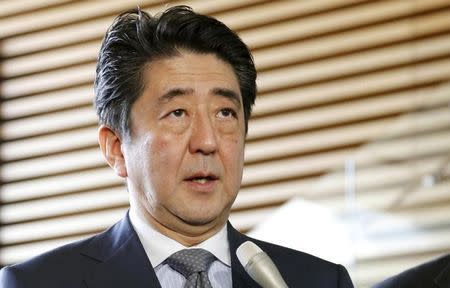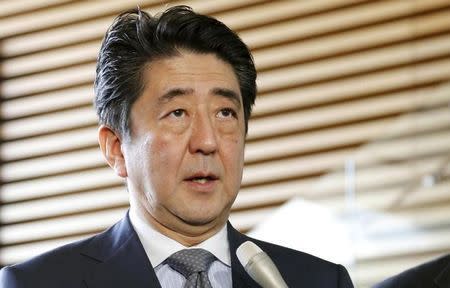BOJ's Kuroda - Told PM Abe Japan's long-term price trend unchanged
By Stanley White
TOKYO (Reuters) - Bank of Japan Governor Haruhiko Kuroda said he told Prime Minister Shinzo Abe on Monday that inflation is slowing due to a decline in oil prices but there is no change in the long-term rising trend for consumer prices as the economy improves.
Kuroda, speaking to reporters after the meeting, said he also told Abe that the economy remains on a gradual recovery path.
Kuroda also said that monetary policy was not discussed, but that may do little to quell speculation that the prime minister had a message for the central bank governor.
The meeting occurred at a time when slowing inflation is testing the BOJ's ability to meet its 2 percent consumer price growth target, and raising questions about whether additional monetary easing is needed later this year to keep prices on track.
"I explained that the economy is doing well and remains on track for recovery," Kuroda told reporters.
"Oil price declines will eventually stop having an impact on consumer prices, so there is no change to the price trend."
The prime minister and the central bank governor regularly meet to exchange views on the economy.
Kuroda said Abe did not ask questions. However, government officials attending the BOJ's policy meeting in February dropped their calls for the central bank to hit its inflation target "at the earliest date possible" - signalling less urgency.
Last week Kuroda admitted that consumer prices could temporarily fall due to lower oil prices but sent a strong signal that he saw no need to expand its quantitative easing.
Data due on Friday are expected to show that excluding the effects of a sales tax hike, the core consumer price index (CPI) rose just 0.1 percent year-on-year in February, as a collapse in oil prices from last year weighs on CPI.
Kuroda has said the BOJ can meet its 2 percent inflation target sometime around fiscal 2015 starting in April, because the output gap between the economy capacity to produce and its actual performance is improving, while the oil price decline will start to fall out of the year-on-year comparison.
Many economists say achieving the target on time is unlikely because inflation may not accelerate fast enough within what many central bank watchers consider to be an overly ambitious timeframe.
(Editing by Edmund Klamann and Eric Meijer)




